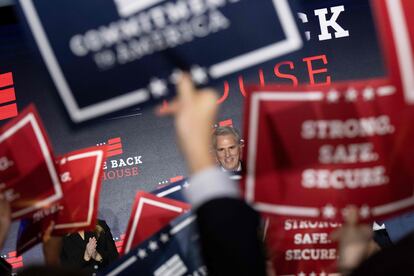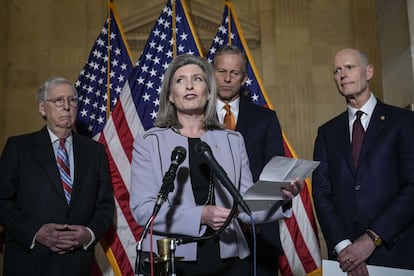The Republicans are looking for an electoral scapegoat: enter Donald Trump
The shadow cast over the campaign by the ex-president, weak party leadership and campaign failures took their toll on conservative aspirations in the US midterms


Florida Republican Senator Rick Scott went to Savannah three weeks ago in support of Senate candidate Herschel Walker. The former NFL star was a struggling contender and Georgia was already shaping up to be a key state in the battle for control of Congress. Pending results in Nevada and Arizona, it seems likely that control of the Senate will be decided in Georgia on December 6, when Walker takes on Raphael Warnock in a runoff vote. Scott, one of the most powerful party members in Washington, laid out before a handful of acolytes the reasons to vote Republican: inflation, “open borders” through which floods the “fentanyl that kills our children,” women’s sports ruined by “transgender ideology,” the “frightening” withdrawal from Afghanistan, indoctrination in schools, “socialism,” “free abortion” right up to the moment of birth.... “If you like that list,” he said, “vote for Warnock. Because he and Joe Biden brought all that.” Flush with reasons (and lies and half-truths), Scott exuded confidence. What could possibly go wrong?
On November 8, a few things went wrong for the Republican Party in the midterm legislative elections. The balance of power in the Senate remains up in the air but it is very likely they will regain the House of Representatives, albeit by a far smaller margin than the predicted “red wave.” And yet they were facing a pliant opponent, reeling from the perfect storm described by Scott, a president with low approval ratings and a discontented electorate. Despite the prevailing wind, a cast-iron US political tradition was broken: since Lyndon B. Johnson was in the White House, the ruling party has lost an average of 45 seats in the House and five in the Senate in the midterm elections. So the Republicans woke up on Wednesday with a nasty electoral hangover, the kind where you wake up and check your pants pockets for your wallet, wondering what the hell happened last night and looking for someone else to blame.
As the search for a scapegoat began, one name stood out above the rest: Donald Trump. The former president’s shadow fell over the entire midterms campaign, as it has over the present and future of the party for six years now. The most conspicuous Republican failures were among Trump-endorsed candidates (others, like J. D. Vance in Ohio, did their own damage). The expectation that next week Trump will announce a run for the White House in 2024 has led some prominent Republicans publicly suggest he hold off until matters are resolved in a month in Georgia. Doing otherwise could spur Democratic mobilization.
For now, Trump has limited himself to summoning the world to his Mar-a-Lago residence on Tuesday to witness “the most important announcement in the history of the United States.” If he intends to back down, and it seems unlikely that he will, it will be interesting to see how he does it: although there is little doubt that, with his proven mastery of the art of sleight of hand, he will find a way. On Wednesday he admitted on his social network, Truth Social, that “in a way, yesterday’s elections were somewhat disappointing.” Trump added: “From my personal point of view it was a great victory: 219 WINS and 16 losses overall. Who has done better than that?” The former president is currently entrenched in Florida, dodging friendly fire, while his most serious challenger in 2024, Republican Governor Ron DeSantis, swept his own election contest.

That fire is also coming from supposedly friendly media. Fox News broadcasts have become a procession of ex-Trump advisors sporting “I knew it” faces, while the New York Post, published two unflattering covers. The first features a headline of “DeFuture” over a photo of DeSantis. In the second, Trump is caricatured as Humpty Dumpty with the tag line: “Can all the GOP’s men put the party back together again?”
There is no clear answer to that question. The disappointing electoral results have also lifted the lid on a party united in its external hatreds but divided internally and lacking strong leadership, in part, due to the shadow of Trump and the centrifugal force towards the extremes of Trumpism, which scared moderate voters away last Tuesday.
In campaign conversations with Republican supporters, politicians and strategists, the “message problem” was a recurring theme. Many warned that the party risked alienating the undecided. And it seems clear that Democratic arguments regarding abortion and the rhetoric of a democracy in danger if left in the hands of election denialism - appeals to a young, diverse and multiracial society, as opposed to the old white and Christian America - also had an effect.

A Trump spokesman accused him on Fox News of abandoning “winnable races like New Hampshire and Arizona.” In the former, the Trump-endorsed Don Bolduc was among the earliest losers on Tuesday. In the latter, votes are still being counted for Blake Masters, whose victory is far from assured despite Peter Thiel, the founder of PayPal, coming to his aid with a donation of $20 million. On Monday, Trump turned his attention to his old sparring partner Mitch McConnell, who faced criticism over his distribution of campaign funds. Speaking to reporters aboard his private jet en route to a rally in Ohio, Trump said. “I think we’ll probably have to put up with him for two more years. If I run and win, he’ll be out in two minutes.”
The future of McConnell, a Republican warhorse with an impassive face, seems less bleak after the election results. Instead, it is Congressman Kevin McCarthy over whom the clouds of doubt have gathered. McCarthy has been preparing to be installed as House Speaker for four years, in place of another veteran, Democrat Nancy Pelosi. However, the forecast that the Republican majority will be tighter than expected will force him into concessions to the extremist wing of the party: the narrower the Republican advantage, the more power each member of Congress will hold to pursue their own interests through blackmail.
One of the members of that extremist wing, Arizona Rep. Andy Briggs, issued an early warning Thursday in a podcast: “We were told there would be an incredible wave coming. If that had been the case, there would have been no choice but to say: ‘Well, okay, Kevin’s going to be the speaker. In light of that, I think we need to have a serious discussion about it.” The ambitious McCarthy, who has already presented his official candidacy, was at least handed meager consolation when Louisiana Congressman Steve Scalise announced his intention to run as his number two. Scalise had been rumored to be a possible challenger to McCarthy in the race to become the third-highest political authority in the United States, behind the president and vice president.
Tu suscripción se está usando en otro dispositivo
¿Quieres añadir otro usuario a tu suscripción?
Si continúas leyendo en este dispositivo, no se podrá leer en el otro.
FlechaTu suscripción se está usando en otro dispositivo y solo puedes acceder a EL PAÍS desde un dispositivo a la vez.
Si quieres compartir tu cuenta, cambia tu suscripción a la modalidad Premium, así podrás añadir otro usuario. Cada uno accederá con su propia cuenta de email, lo que os permitirá personalizar vuestra experiencia en EL PAÍS.
¿Tienes una suscripción de empresa? Accede aquí para contratar más cuentas.
En el caso de no saber quién está usando tu cuenta, te recomendamos cambiar tu contraseña aquí.
Si decides continuar compartiendo tu cuenta, este mensaje se mostrará en tu dispositivo y en el de la otra persona que está usando tu cuenta de forma indefinida, afectando a tu experiencia de lectura. Puedes consultar aquí los términos y condiciones de la suscripción digital.








































